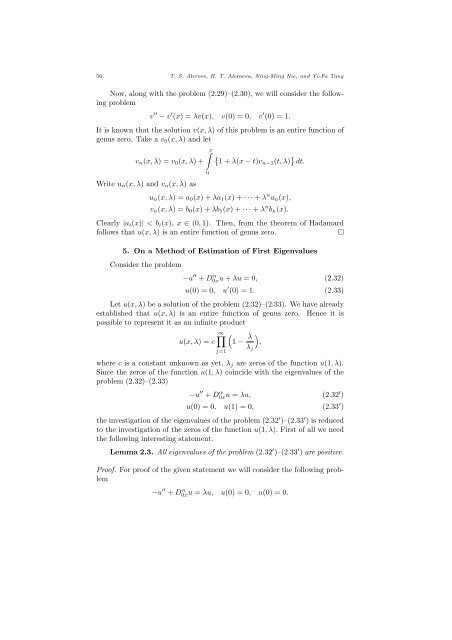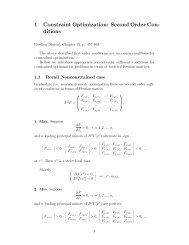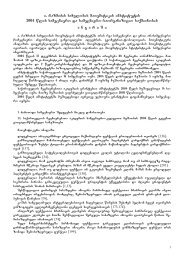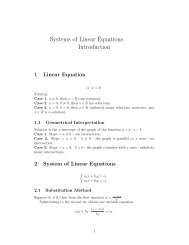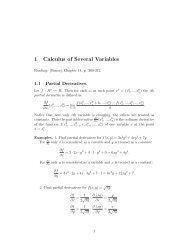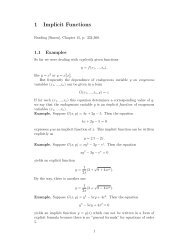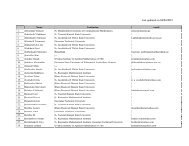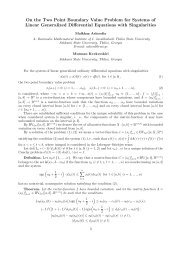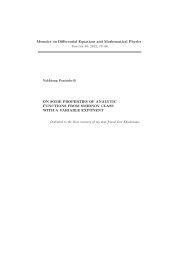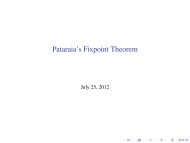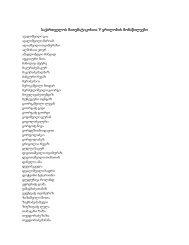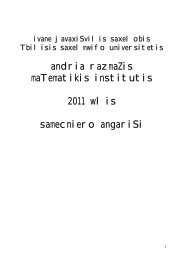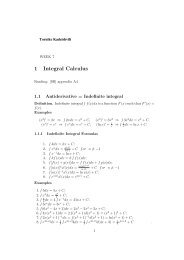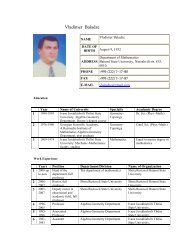56 T. S. Aleroev, H. T. Aleroeva, Ning-Ming Nie, and Yi-Fa TangNow, along with the problem (2.29)–(2.30), we will consider the followingproblemv ′′ − v ′ (x) = λv(x), v(0) = 0, v ′ (0) = 1.It is known that the solution v(x, λ) of this problem is an entire function ofgenus zero. Take a v 0 (x, λ) and letv n (x, λ) = v 0 (x, λ) +Write u n (x, λ) and v n (x, λ) as∫ x0{1 + λ(x − t)vn−1 (t, λ) } dt.u n (x, λ) = a 0 (x) + λa 1 (x) + · · · + λ n a n (x),v n (x, λ) = b 0 (x) + λb 1 (x) + · · · + λ n b n (x).Clearly |a i (x)| < b i (x), x ∈ (0, 1). Then, from the theorem of Hadamardfollows that u(x, λ) is an entire function of genus zero.□5. On a Method of Estimation of First EigenvaluesConsider the problem−u ′′ + D α 0xu + λu = 0, (2.32)u(0) = 0, u ′ (0) = 1. (2.33)Let u(x, λ) be a solution of the problem (2.32)–(2.33). We have alreadyestablished that u(x, λ) is an entire function of genus zero. Hence it ispossible to represent it as an infinite product∞∏u(x, λ) = c(1 − λ ),λ jj=1where c is a constant unknown as yet, λ j are zeros of the function u(1, λ).Since the zeros of the function u(1, λ) coincide with the eigenvalues of theproblem (2.32)–(2.33)−u ′′ + D α 0xu = λu, (2.32 ′ )u(0) = 0, u(1) = 0, (2.33 ′ )the investigation of the eigenvalues of the problem (2.32 ′ )–(2.33 ′ ) is reducedto the investigation of the zeros of the function u(1, λ). First of all we needthe following interesting statement.Lemma 2.3. All eigenvalues of the problem (2.32 ′ )–(2.33 ′ ) are positive.Proof. For proof of the given statement we will consider the following problem−u ′′ + D α 0xu = λu, u(0) = 0, u(0) = 0.
Boundary Value Problems for Differential Equations of Fractional Order 57This problem is equivalent to the equationDenoteu(x) = x +K 1 (x, t) =∫ x0[(x − t) 1−α − λ(x − t) ] u(t) dt. (2.34){[(x − t)1−α ] , 0 ≤ t < x < 1,0, x < t ≤ 1.We will define the further sequence of kernels {K n (x, t)} ∞ 1recurrent equalitiesK n+1 (x, t) =∫ xElementary calculations show thatK 2 (x, t) = λΓ(1 − α)Γ(2 − α)Γ(4 − 2α)Using induction in n we obtaint− 2λK n (x, t 1 )K 1 (x, t 1 ) dt 1 .(x − t) 3−2α −Γ(2)Γ(2 − α)Γ(4 − α)by means of the(x − t) 3−α + 1 3! (x − t)3 .K n+1 (x, t) = K 0 n+1(x, t) − λK 1 n+1(x, t) + λK 2 n+1(x, t) + · · · , x ≥ t.Elementary calculations show that Kn+1(x, i t) ≥ 0 for x ≥ t for any n. Fromhere for the resolvent of the equation (2.34) we have the formula∞∑R(x, λ, t) = K n+1 (x, t, λ) = a 0 (x, t) − λa 0 (x, t) + λ 2 a 2 (x, t) + · · · ,n=0where a i (x, t) ≥ 0 for x ≥ t. Since the solution (2.34) is represented aswe haveu(1, λ)1 +∫ 10u(x) = x +∫ x0R(x, λ, t)t dt,R(1, λ, t)t dt = ã 0 − λã 1 + λ 2 ã 2 − λ 3 ã 3 + · · · ,where ã 0 , ã 1 , . . . , ã n , . . . are nonnegative numbers. Thus λ is an eigenvalueof the problem (2.32)–(2.33), iff λ is a zero of the function w(λ) = u(1, λ) =ã 0 − λã 1 + λ 2 ã 2 − · · · . But it is obvious that w(λ) hasn’t negative zeros.From the estimates obtained in (2.32) it follows that the eigenvalues{λ j } of the problem satisfy the equality j=1 ∑∞λ −1j< ∞. Therefore for the
- Page 4 and 5: 24 T. S. Aleroev, H. T. Aleroeva, N
- Page 8 and 9: 28 T. S. Aleroev, H. T. Aleroeva, N
- Page 10 and 11: 30 T. S. Aleroev, H. T. Aleroeva, N
- Page 12 and 13: 32 T. S. Aleroev, H. T. Aleroeva, N
- Page 14 and 15: 34 T. S. Aleroev, H. T. Aleroeva, N
- Page 16 and 17: 36 T. S. Aleroev, H. T. Aleroeva, N
- Page 18 and 19: 38 T. S. Aleroev, H. T. Aleroeva, N
- Page 20 and 21: CHAPTER 2The Sturm-Liouville Proble
- Page 22 and 23: 42 T. S. Aleroev, H. T. Aleroeva, N
- Page 24 and 25: 44 T. S. Aleroev, H. T. Aleroeva, N
- Page 26 and 27: 46 T. S. Aleroev, H. T. Aleroeva, N
- Page 28 and 29: 48 T. S. Aleroev, H. T. Aleroeva, N
- Page 30 and 31: 50 T. S. Aleroev, H. T. Aleroeva, N
- Page 32 and 33: 52 T. S. Aleroev, H. T. Aleroeva, N
- Page 34 and 35: 54 T. S. Aleroev, H. T. Aleroeva, N
- Page 38 and 39: 58 T. S. Aleroev, H. T. Aleroeva, N
- Page 40 and 41: 60 T. S. Aleroev, H. T. Aleroeva, N
- Page 42 and 43: 62 T. S. Aleroev, H. T. Aleroeva, N
- Page 44 and 45: 64 T. S. Aleroev, H. T. Aleroeva, N
- Page 46 and 47: CHAPTER 3Solving Two-Point Boundary
- Page 48 and 49: 68 T. S. Aleroev, H. T. Aleroeva, N
- Page 50 and 51: 70 T. S. Aleroev, H. T. Aleroeva, N
- Page 52 and 53: 72 T. S. Aleroev, H. T. Aleroeva, N
- Page 54 and 55: 74 T. S. Aleroev, H. T. Aleroeva, N
- Page 56 and 57: 76 T. S. Aleroev, H. T. Aleroeva, N
- Page 58 and 59: Since∣∣f(t, u 2 ) − f(t, u 1
- Page 60 and 61: agreement with the fact that (3.33)
- Page 62: 82 T. S. Aleroev, H. T. Aleroeva, N


